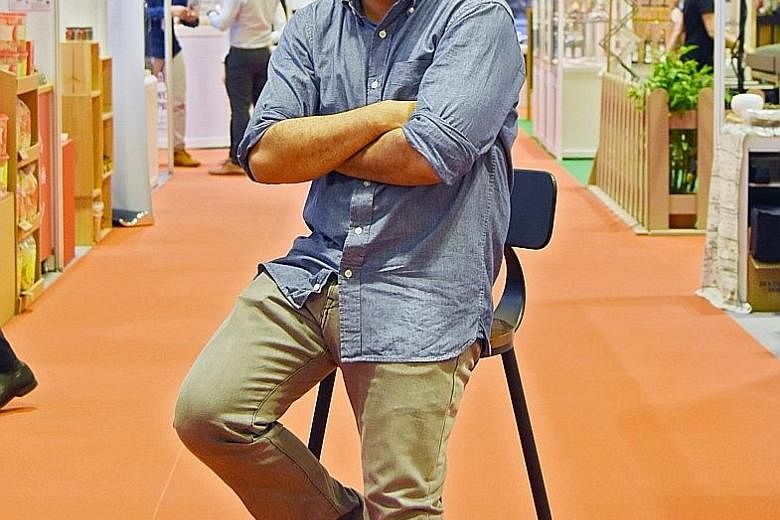Go local or go home. Not only does chef-owner Ray Adriansyah - one-half of the dynamic duo behind famed Bali restaurant Locavore - live by this mantra, he also wears these words on his cap.
But those unfamiliar with his 31/2-year-old restaurant in Ubud may not understand how much the statement means to him, he says, and so he feels that it is better that he not wear the cap for the photo shoot with The Straits Times.
Adriansyah is in town for the inaugural Specialty & Fine Food Asia, a food and beverage trade show at Suntec Singapore Convention & Exhibition Centre, where he did a cooking demonstration and spoke on a panel about sustainability in the food industry.
He is passionate about the subject and looks at it from different angles. In Singapore's context, he says: "Cooking laksa, for example, can be sustainable if you use local ingredients in order to support local businesses. The same goes for hawker centres. You are eating local food too. In some cities, sustainability works more naturally."
At Locavore, his mission to champion sustainability is to go local. This rings true from the restaurant's name to the produce it uses and team of 40 staff - with the exception of Dutch-born co-owner Eelke Plasmeijer, 36.
The two of them met more than eight years ago at fine-dining restaurant Shy in Jakarta, where Plasmeijer was head chef and Adriansyah was sous chef.
They opened Locavore in November 2013 and built it into a must- visit dining destination in Bali. The restaurant debuted on the Asia's 50 Best Restaurants list last year at No. 49 and catapulted to No. 22 this year. It is known for its "locavore" or "herbivore" tasting menus that are influenced by European and Indonesian cuisines.
Earlier this month, they opened a sister outlet called Nusantara - which means "archipelago". They also run a cocktail bar called Night Rooster, as well as a take-away and deli place. The outlets are all near Locavore.
Nusantara showcases Indonesian cuisine from different cities and, like Locavore, uses local produce. But unlike Locavore, there are no tasting menus. Everything is ordered a la carte for "family-style" dining.
The Jakarta-born Adriansyah points out: "There's no nasi goreng or mee goreng on the menu. If there's a rendang, it'll be the one I grew up eating."
The menu features dishes such as Aceh-style ayam tangkap or deep-fried free-range chicken served with green chillies, fried pandan, curry and turmeric leaves; and kalio kambing (from Padang, West Sumatra), which is braised goat leg cooked in kalio spice paste and fresh coconut milk.
Other projects include setting up a Localab for research and development, and running a butchery called Local Parts, which currently supplies charcuterie items to Locavore.
At Locavore, items such as tempeh, vinegar, cheese made with cashews and coconut milk, and tofu, are made in-house. And it no longer serves sourdough bread. Instead, diners are given house-made cassava bread, to avoid using imported flour, adds Adriansyah.
All these efforts, he says, go into building a database of local ingredients for what he calls a "Loca-paedia".
He also works directly with local farmers for everything from vegetables to fish to lamb.
"The meat might not be the best in the world, but I believe that food should not travel that far. And it shouldn't be in plastic bags. We are always in direct contact with farmers, not food distributors," says Adriansyah, who comes from a family of lawyers.
He and his Indonesian wife, 39, who does property management, have a four-year-old son.
While many people may assume that sourcing locally is cost-saving, Adriansyah - who ditched business school for culinary school - says that getting lamb from Java can be more expensive than from Australia. As opposed to imports, getting locally sourced meat requires him to bear additional costs of transportation, quarantine and storing of the meat.
Moving forward, he hopes to regrow his vegetable garden - which did not work out because of a long drought in the restaurant's second year of operation - as well as rear his own livestock.
And to build a sustainable ecosystem, he hopes that other restaurants will eventually follow suit. He says: "Bali is a tourist destination with all kinds of food, but still not many use local produce."
While he has been asked several times if he will expand overseas, he says with a chuckle: "We're not Locavore if we're not using local produce and, even in Jakarta, it might not work. The level of appreciation in Jakarta is not there yet and our food can be intimidating. People are more open-minded in Bali."
•Follow Eunice Quek on Twitter @STEuniceQ

